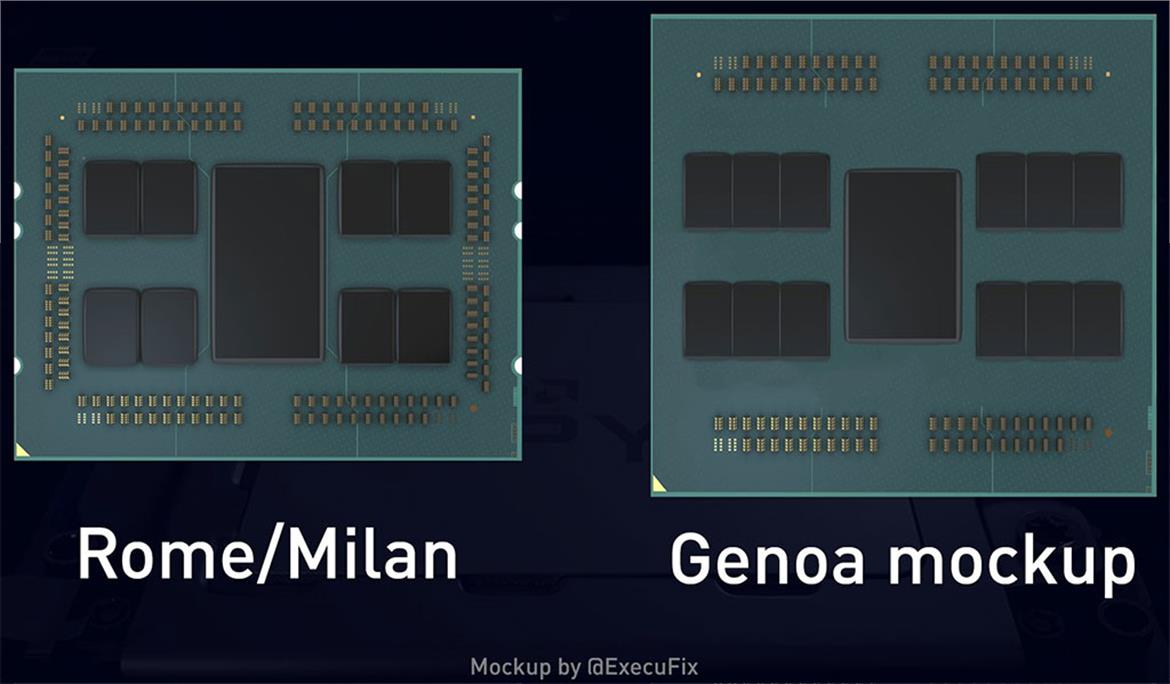
AMD has not yet released its fourth generation EPYC “Milan” server processors based on its Zen 3 CPU architecture, but barring any last minute snags, those chips are coming any day now. Looking further down the road, a new leak highlights a possible fourth generation EPYC “Genoa” configuration based on Zen 4, with some interesting details.
AMD EPYC Genoa Specs leak
Details of AMD’s next-generation EPYC Genoa Server CPU lineup which will feature the Zen 4 core architecture have leaked out by ExecutableFix. The details point out various specifications for the upcoming lineup and the respective SP5 platform which will succeed AMD’s existing SP3 platform that has lasted three generations of EPYC CPUs including Naples, Rome, and the upcoming, Milan.
Up to this point, details about Genoa have been rather scarce. We know it will be built on TSMC’s 5-nanometer manufacturing process, and that it will power El Capitan, which is set to become the world’s most powerful supercomputer when it is fully deployed in 2023. The latter revelation comes by way of a joint announcement between AMD, Hewlett Packard Enterprise (HPE), and Lawrence Livermore National Laboratory (LLNL).
“El Capitan will be powered by next-generation AMD EPYC processors, code-named ‘Genoa’ and featuring the ‘Zen 4’ processor core, next-generation AMD Radeon Instinct GPUs based on a new compute-optimized architecture for workloads including HPC and AI, and the AMD Radeon Open Compute platform (ROCm) heterogenous computing software,” LLNL said last year.
We have heard some little tidbits about AMD’s EPYC Genoa in the past but it looks like the latest tweet by ExecutableFix spills the beans on the grandest EPYC launch to date. AMD will be moving over to a new platform and introducing so many new features that each one deserves a special mention of its own. The Genoa lineup is pinned to ship later this year with a hard launch around 2022.
96-cores (192 threads)
12-channel DDR5-5200
128 PCIe 5.0 lanes (160 for 2P)
320W TDP (cTDP 400W) 🔥
SP5 (LGA-6096) socketGenoa everyone 😍
— ExecutableFix (@ExecuFix) February 28, 2021
The leaker also concocted a render of Genoa, to show how it might possibly compare in appearance and makeup to Rome (Zen 2) and Milan (Zen 3). This is not a real image, mind you, but a “mockup based on the Rome image” depicted at a 1:1 scale. “This is what Genoa will look like under the hood compared to Rome/Milan,” @ExecuFix says.

Supposedly, anyway. Another leaker, a “retired engineer and businessman” who goes by @chiakokhua on Twitter, replied to the mockup saying, “Bet you $6 this is incorrect.” This prompted a response by @ExecuFix, who said they will “gladly take your $6.”
Starting with the details, AMD has already announced that EPYC Genoa would be compatible with the new SP5 platform which brings a new socket so SP3 compatibility would exist up till EPYC Milan. The EPYC Genoa processors would also feature support for new memory and new capabilities. In the latest details, it is reported that the SP5 platform will also feature a brand new socket that will feature 6096 pins arrange in the LGA (Land Grid Array) format. This will be by far the biggest socket that AMD has ever designed with 2002 more pins than the existing LGA 4094 socket.
The socket will support AMD’s EPYC Genoa and future generations of EPYC chips. Talking about Genoa CPUs themselves, the chips will pack a mammoth 96 cores and 192 threads. These will be based on AMD’s brand new Zen 4 core architecture which is expected to deliver some insane IPC uplifts while utilizing the TSMC 5nm process node. A recent rumor had pointed out that the AMD EPYC Genoa CPUs are expected to offer up to 29% IPC uplift over Milan CPUs and a 40% overall improvement thanks to other key technologies that we will get to in a bit.

To get to 96 cores, AMD has to pack more cores in its EPYC Genoa CPU package. AMD is said to achieve this by incorporating a total of up to 12 CCD’s in its Genoa chip. Each CCD will feature 8 cores based on the Zen 4 architecture. That aligns with the increased socket size and we could be looking at a massive CPU interposer, even larger than the existing EPYC CPUs. The CPU is said to feature TDPs of 320W which will be configurable up to 400W.
Now that’s one area which has seen a massive increase. The current top parts max out at 280W TDPs so a TDP of 400W is an insane 120W more than Milan. But given the increased performance and core counts, we can definitely expect some top-notch efficiency for Genoa. At the same time, we can also expect faster clock speeds, especially the base frequencies which could take a direct benefit of the increased TDP. The IO die will be separate from the CCD’s and that will bring up the total chiplet count on the chip to 13.
Other than that, it is stated that AMD’s EPYC Genoa CPUs will feature 128 PCIe Gen 5.0 lanes, 160 for a 2P (dual-socket) configuration. The SP5 platform will also feature DDR5-5200 memory support which is some insane improvement over the existing DDR4-3200 MHz DIMMs. But that’s not all, it will also support up to 12 DDR5 memory channels and 2 DIMMs per channel which will allow up to 3 TB of system memory using 128 GB modules.
The main competitor of AMD’s EPYC Genoa lineup would be Intel’s Sapphire Rapids Xeon family which is expected to launch in 2022 too with PCIe Gen 5 and DDR5 memory support. The lineup was recently rumored to not get a volume ramp until 2023. Overall, AMD’s Genoa lineup seems to be in great form after this leak and could be a major disruption for the server segment if AMD plays its cards right till Genoa’s launch. Sapphire Rapids is also rumored to employ up to four 16GB HBM2 cores, which could make things interesting.


